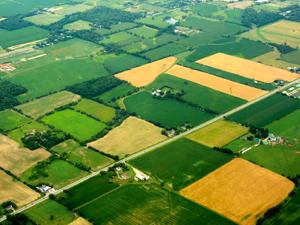Farmland rental troubles? Take a good look at your relationship with your landowner

As land values increase, so do land rental rates, but commodity prices don’t always follow the same trajectory, although input costs might. So how do you come to an arrangement to rent land that is fair and profitable for both parties, because that’s the number one consideration if both want a stable, long-term deal.
“Communication and trust is a huge deal in land rental,” says Roy Arnott, farm management specialist with Manitoba Agriculture. “Ultimately what producers care about is care and control of their land base, whether they own it or rent it. Landowners care about getting a reasonable rate of return on their investment and having their land cared for. If renters have honest, open discussions with their landlord, and take care of the land, it gives the landowner a lot of comfort. Not sharing information and indications of bad management practices can make a landowner very nervous.
On the other hand, if a landowner is not communicating with a renter in terms of what he or she expects and why they want to make a change, the renter is going to start looking elsewhere for land and be gone.”
1. Sometimes you have to walk away

There may be situations where you just have to walk away, says Lance Stockbrugger, a farmer and chartered accountant from Engelfeld, Sask. “It’s not worth me farming more land for the sake of farming more land — it needs to be profitable,” he says. “If I hear land is available and I talk to the landowner and realise we are just not going to be able to reach an agreement I would walk away. It needs to be fair. I don’t want to cheat the landowner but I don’t want to be cheated myself.”
Sometimes it’s a case of wanting to hang on to land that you’re already renting but the landowner has maybe listened to a little too much coffee shop gossip about what neighbours are getting for land rent. In that situation it’s important to be open with the financial numbers, says Stockbrugger. “I’ll go through and do a cost basis analysis and show them this is what I am potentially going to be looking at, and this is the potential return, and explain to them that we both want to make money at this endeavour,” he says. “If you want me to farm your land, and want me to look after it and treat it right then we need to be fair to both parties."
2. Lay our your long-term plan

Making sure that the landowner understands your full three- or five-year plan for your farm — including the rented land — and that there are going to be good years and bad years will help you to reach a deal that averages out the risk for both. “Sometimes it just takes a conversation to say we there are going to be years when I do really well and years when I don’t do very well, and I am going to pay you regardless of good or bad and I expect that if I treat you good, you treat me good,” says Stockbrugger.
But it’s important not to only emphasize the negative. “Don’t just harp on the bad years when it’s tough. When you have good years celebrate that with your landowners and maybe sometimes give them a bonus. They need to understand there are years you are going to be making money and there are years when you are not making much, and don’t be embarrassed about making money because we are in a business and we need to make money out of it. Having those discussions is so important.”
3. Be open with absentee landowners

It’s much easier to have these discussions with landowners who understand farming, like the retired farmers who Stockbrugger rents most of his land from. They still live on their farms and see how the crops are looking, the flooded acres, or drought stricken areas. They understand what that means to the production and profitability of the farm because they’ve all been through it. It’s more challenging to deal with absentee landowners who may not have much knowledge of farming.
But some absentee landowners may have inherited land from relations and have little or no connection to farming on a daily basis. Developing a relationship with them takes more work and education to help them understand the daily realities faced by the people farming their land. Stockbrugger keeps his absentee landlords informed about how the season is progressing, sending pictures of things like seeding and harvesting. His advice is to be open with absentee landlords, and let them know some of the good things that are happening on the farm, not just the bad.
Most rental deals are still straightforward cash transactions, although some farmers do use other methods like crop shares or a percentage of gross profit on the crop, but Stockbrugger advises farmers not to over complicate arrangements with landowners who don’t fully understand farming or don’t have ties to it on a daily basis. “If all a sudden the cheque is half the amount they have been getting in previous years, you will have to do a lot of explaining to do,” he says.
4. Show some appreciation

Showing some appreciation for the landowner never hurts either. Stockbrugger hosted a post harvest barbecue last year and invited his landowners and everyone who had helped with the harvest, and says they were talking about it for weeks. “It’s often the little things that help the relationship,” he says.
For landowners, who also face cost increases such as higher taxes as land values go up, they expect a fair deal just like the renter does, but it’s often the case that they can make a bigger rate of return on renting their farmland than selling it and investing the money. “In a lot of cases we are paying more in rent than they would get in a GIC in a bank account,” says Stockbrugger. “Sometimes we need to remind them of what kind of return they’re getting on their land and whether that’s fair for the risk they’re taking. It’s important to feel that neither party is being taken advantage of.”
The allure of more rental land can be seductive to some farmers, but it’s important to keep a clear head about what it means for your farm business, and that may mean bringing in some professional advice from accountants or bankers, or government extension advisors like Arnott. “Talk to your banker in terms of how paying an amount for land rent will affect profitability, and how that affects your ability to borrow and secure capital for your business,” says Arnott. “Your banker can be a useful resource as you’re going through thoughts and discussions to ensure you’re not going to wander too far out of your normal comfort zone to find and secure land."
Resources to help with negotiating rental agreements

Manitoba Agriculture has developed a list of “Land Rental Considerations” that includes a list of things for both landlords and tenants to consider. You can find it at: www.gov.mb.ca/agriculture/business-and-economics/business-management/land-rental-considerations-landlords-tenants.html.
Farm Credit Canada has also created resources for renters and tenants. Look for these on FCC’s website (www.fcc-fac.ca). In the FCC search box, search for “Renting Farmland: What You Need to Know.”















